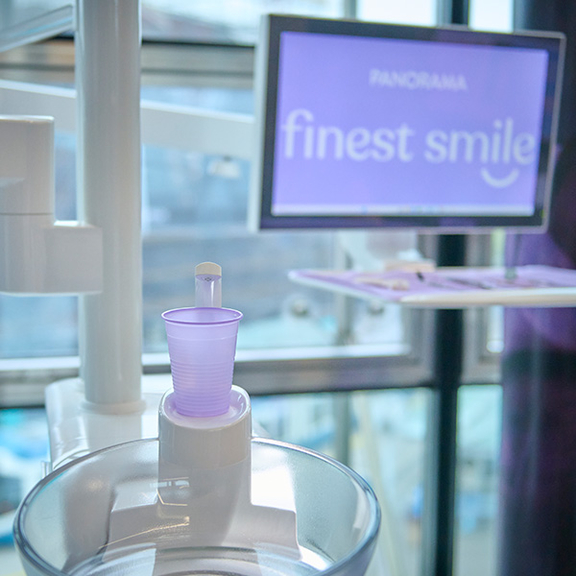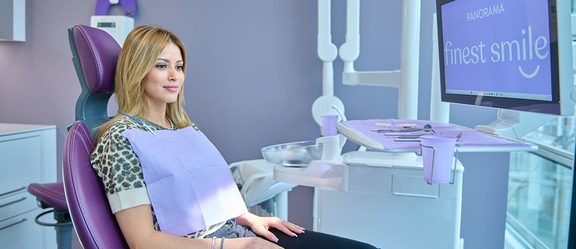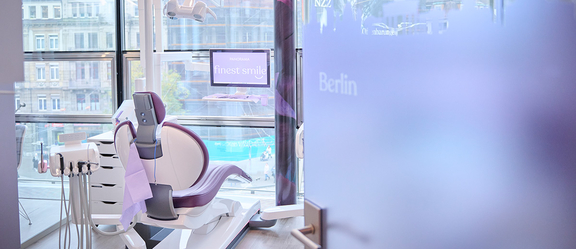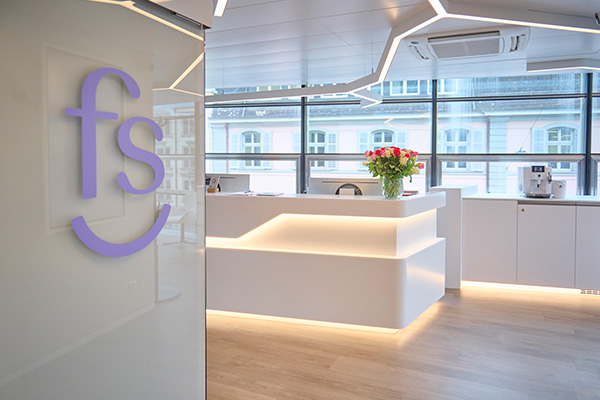Facts about Gum Reconstruction

Indication:
Gum recession, gum loss, genetically thin gum tissue
Treatment methods:
Root coverage, gum grafting, veneers, crowns, implants, preventive measures
Treatment duration:
Depending on the method, typically 4–6 weeks
Costs:
Vary depending on the complexity of treatment / number of teeth treated
The health of the gums plays a crucial role in the long-term preservation of natural teeth. Inflammation of the gums (gingivitis) and periodontitis, as well as genetic predisposition and external factors, can cause the gum tissue to recede over time. This often manifests as exposed tooth necks, which may become sensitive to heat and cold. Although specific toothpastes can temporarily alleviate discomfort, they do not address the underlying cause or restore lost tissue.
Functional disorders such as teeth grinding or jaw clenching, as well as an improperly adjusted bite, may also overload the supporting structures of the teeth and contribute to gum recession.
The most effective treatment approach is to first eliminate the underlying causes (e.g. periodontitis, functional disorders, genetically thin gum type, or tooth misalignment) and subsequently rebuild the lost or thinned tissue through a minor surgical procedure (root coverage, gum augmentation, or gum thickening). In doing so, exposed tooth necks—often perceived as unaesthetic when smiling—can be effectively covered, restoring both the natural protection and stability of the teeth.
Another key indication for gum reconstruction is the placement of dental implants. The long-term health and success of implants depend not only on adequate bone volume but also on a sufficient amount of healthy, keratinized gum tissue surrounding the implant necks.
We invite you to schedule a consultation with our experienced dental specialists in Zurich for a professional assessment and individual advice regarding gum recession and gum reconstruction.

Frequently Asked Questions about Gum Recession and Gum Reconstruction in Zurich
Does gum recession require treatment?
In most cases, treatment is recommended. Without intervention, gum recession can lead to further complications and functional impairments. Our dental team in Zurich will assess your individual situation and advise on the most suitable treatment options to help preserve your teeth—and your smile—for as long as possible.
What can be done about gum recession?
Once gum tissue has receded, it will not regenerate on its own. However, modern dental techniques offer several ways to relieve associated symptoms, rebuild lost tissue, and improve aesthetics.
An effective method is root coverage surgery. In this procedure, connective tissue is harvested from the palate and sutured onto the exposed tooth roots to cover and stabilize them. For an even and harmonious gum line, veneers or crowns may also be used. Precision-crafted ceramic restorations support the soft tissue and help maintain the interdental papillae.
When is gum reconstruction not possible?
Gum reconstruction cannot be performed during acute gum diseases such as gingivitis or periodontitis. These underlying conditions must first be successfully treated. Only after inflammation has subsided can root coverage or grafting procedures be considered. Suitability is determined individually following a thorough clinical examination.
What should be considered before gum reconstruction?
Prior to treatment, it must be ensured that both teeth and gums are free from inflammation. General health should be stable. Please inform our team about any acute or chronic medical conditions as well as medications you take regularly. Adjustments to the treatment plan or medication may be required to ensure optimal results.
Is gum reconstruction painful?
No. The procedure is performed under local anesthesia and is therefore generally painless. You may experience slight pressure or tension during the process. In the days following treatment, mild discomfort may occur but can usually be managed easily with over-the-counter pain medication.
Are there risks associated with gum reconstruction?
When performed professionally, gum reconstruction is a safe procedure with minimal risks. As with any surgical intervention, temporary swelling, redness, delayed healing, or infection may occur. With proper preparation and postoperative care—such as avoiding smoking, maintaining good oral hygiene, and allowing adequate rest—these risks can be significantly minimized.
Can gum recession be prevented?
Yes, to a certain extent gum recession can be prevented through consistent and thorough oral hygiene. Preventive measures include:
- Brushing teeth at least twice daily with the correct technique and a soft-bristled toothbrush
- Cleaning interdental spaces with dental floss or interdental brushes
- Gently massaging the gums
- Using tongue cleaners
- Scheduling professional dental cleanings and regular check-ups
What are the benefits of gum reconstruction?
Gum reconstruction provides numerous advantages, including:
- Health benefits: Protection of exposed tooth roots from decay and wear, and reduction of sensitivity. Prolonging the healty life of your teeth.
- Functional benefits: Enhanced tooth stability and prevention of loosening.
- Aesthetic benefits: A more harmonious and balanced appearance of the gum line and smile.
Your Benefits of Treatments at Our Dental Practice
- Owner-managed practice
- Central location near Zurich Main Station
- Over 20 years of experience in dentistry
- Dentists for implants, aligners, and reconstructive dentistry
- All treatments performed on-site
- Easy appointment scheduling & short waiting times
- Pain-free & gentle treatment methods
- Guaranteed quality according to SSO & ITI guidelines
- Warranty on dental and technical work in accordance with SSO standards
- Transparent, fair billing with optional flat-rate offers
What causes gum recession?
Common causes include:
- Inflammatory diseases: Gum inflammation and periodontitis can progressively lead to gum loss.
- Non-inflammatory recession: Gum tissue may recede due to incorrect brushing techniques, trauma, or poorly fitting restorations.
- Genetic predisposition: Some individuals naturally have thinner gum tissue, particularly in the front tooth region, which is more prone to recession.
- Functional disorders or malocclusion: Teeth grinding, clenching, or misaligned teeth can place excessive stress on the gums and supporting tissues.
When is gum reconstruction recommended?
Gum recession increases the risk of inflammation, bleeding, and root caries on exposed tooth surfaces. Additionally, the exposed areas are often sensitive to cold, heat, or touch—symptoms that can significantly affect daily life. Once these symptoms appear, treatment is advisable. Left untreated, gum recession may progress and ultimately lead to tooth mobility or loss. For this reason, early diagnosis and timely intervention are essential.
How is gum reconstruction performed in Zurich?
The procedure depends on the severity and extent of tissue loss. For mild recession, the sliding flap technique is often used. Here, the root surface is cleaned and adjacent tissue is mobilized and repositioned to cover the exposed area.
In more progressive cases, a connective tissue graft is performed. Tissue is taken from the palate and transplanted to the affected area. In patients with implants, a mucosal graft may be used instead, transferring a small section of mucosa from the palate to the implant site. The grafted tissue is carefully sutured to ensure stable integration and optimal healing.
During the initial healing period, a soft diet is recommended. Patients should follow all oral hygiene instructions and attend scheduled follow-up appointments to monitor healing progress.
How much does gum reconstruction cost in Zurich?
Treatment costs vary depending on the extent and type of procedure. After an initial examination and personal consultation, you will receive a detailed treatment plan and cost estimate tailored to your specific needs.


Contact
Dentist Zurich - finest smile
Seidengasse 20
8001 Zurich
Opening hours:
Monday to Friday
7:00 am to 8:00 pm
Phone
044 504 57 56